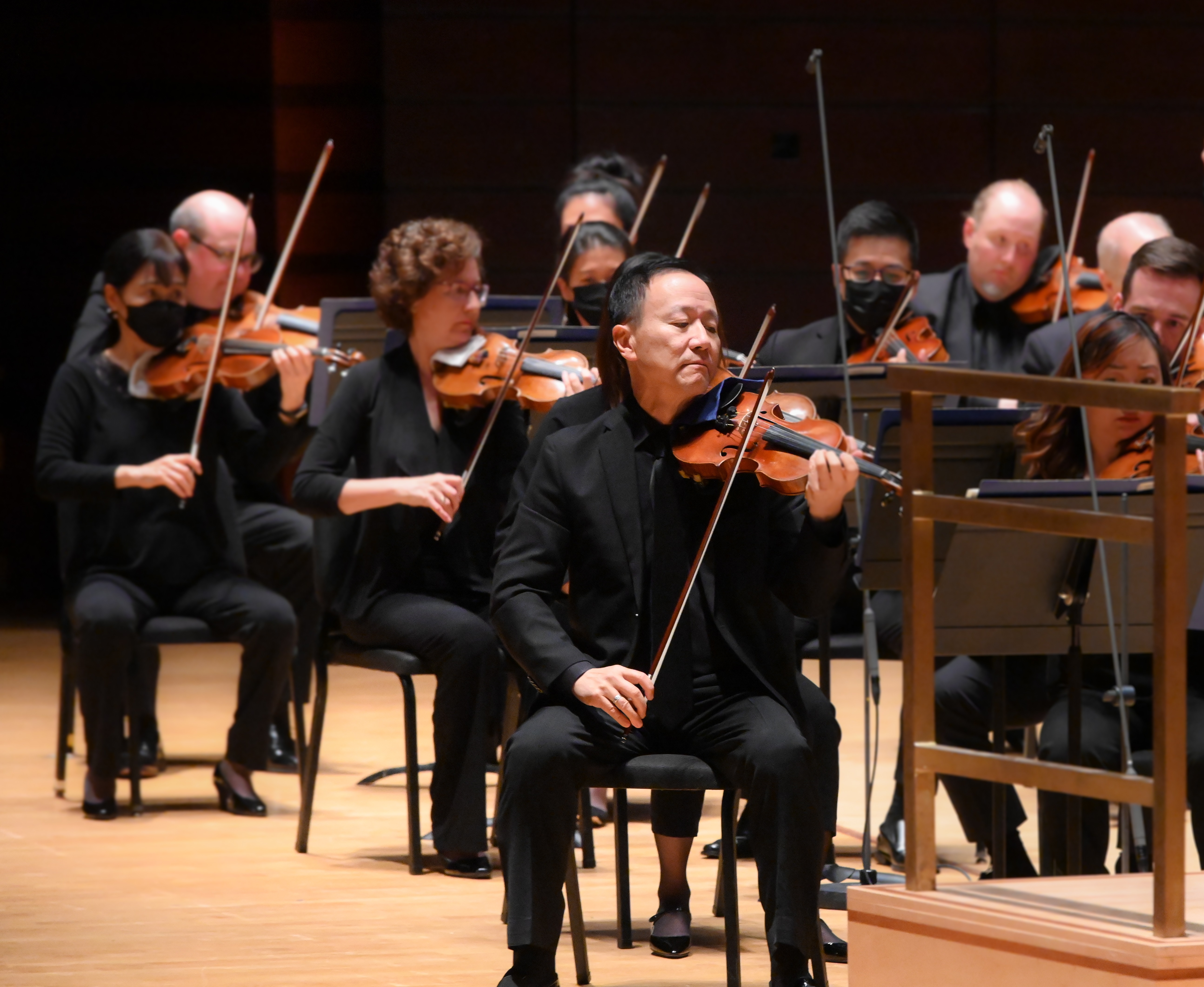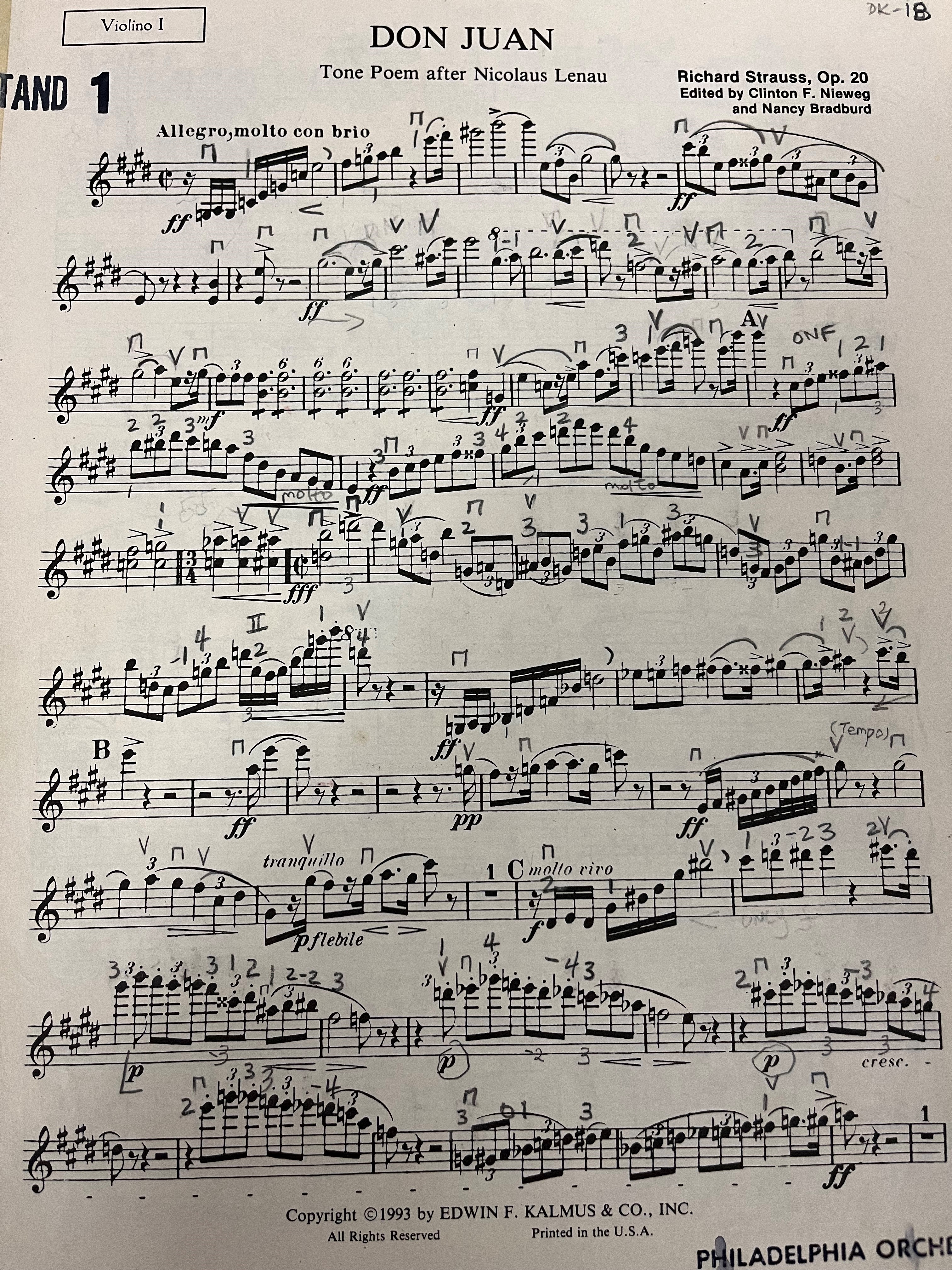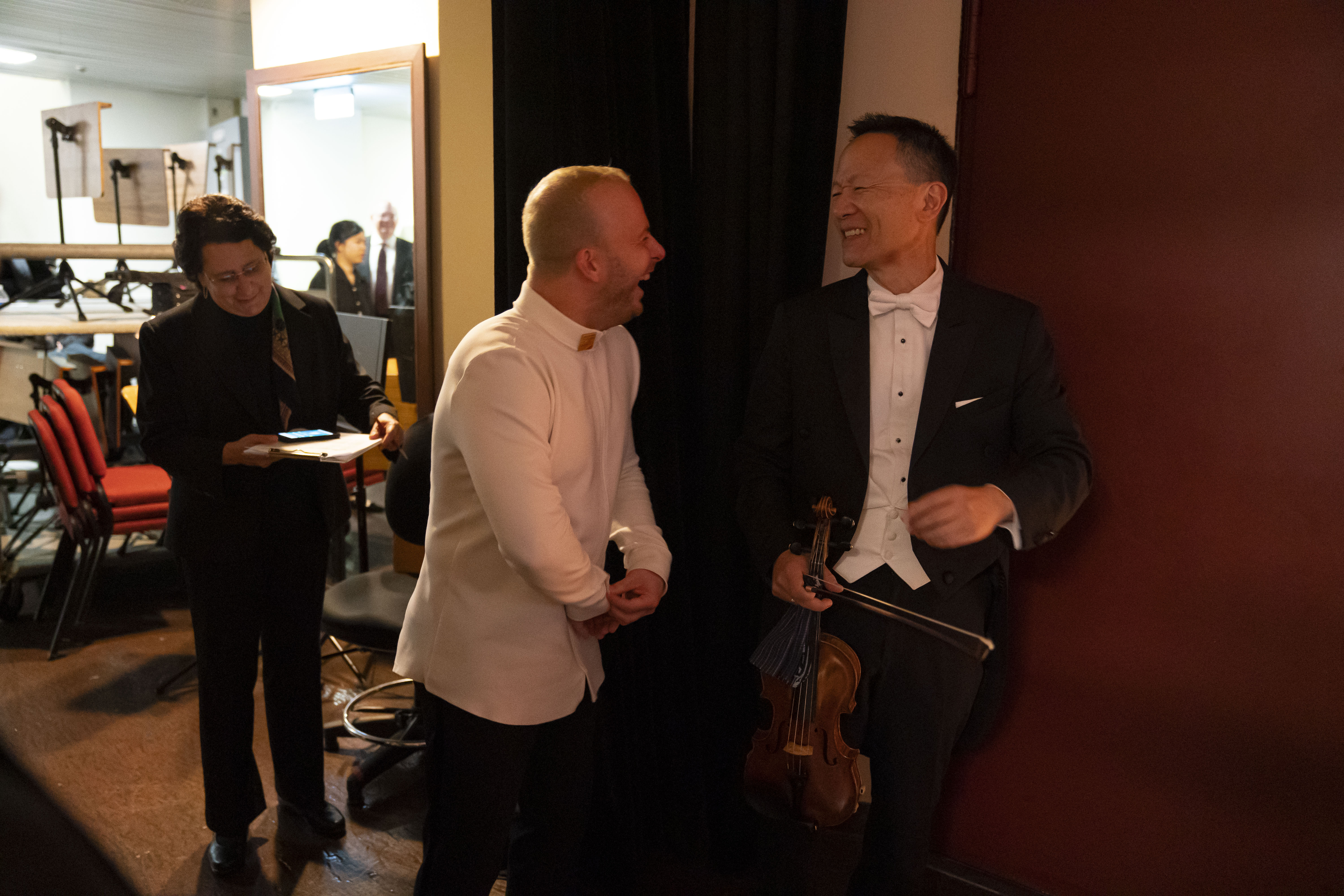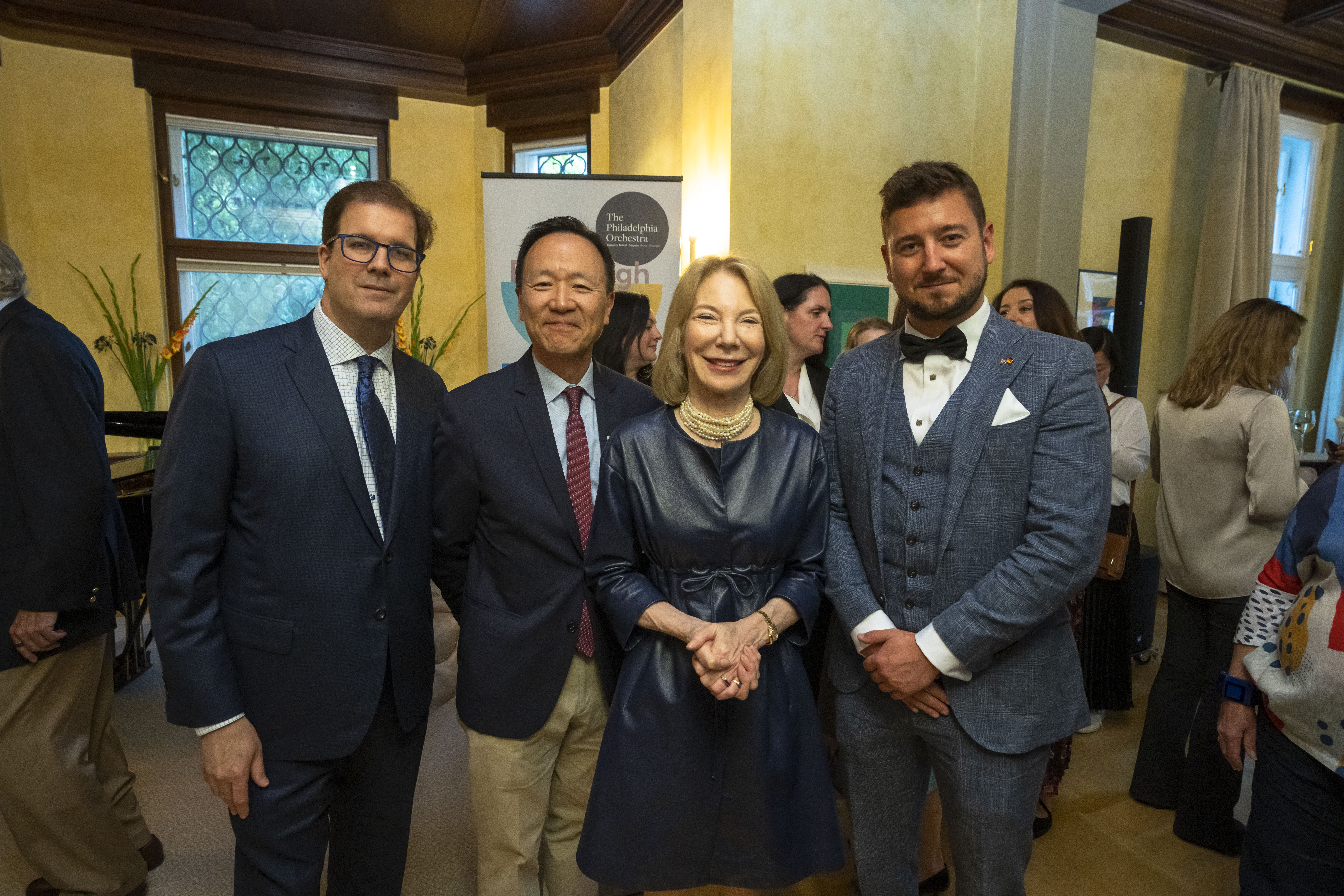We know the routine: The concertmaster is the last orchestra member to take the stage. He nods at the principal oboe, who sounds an “A,” and then everyone tunes.
Ask Philadelphia’s concertmaster, David Kim, if all that is just a ritual, he bristles (but good naturedly): “Hardly!”

Concertmaster David Kim during a recent concert. Photo: Pete Checchia
All kidding aside, “it’s actually really important. Onstage temperature is affected by lighting and barometric pressure, and that can make the instruments change pitch. Plus, different oboists play different pieces in a concert, and everybody’s ‘A’ is slightly different. So we adjust; otherwise, the music isn’t going to feel right.”
Long before that all-important tune-up, David has been hard at work. For example, by tradition, an orchestra’s concertmaster works out the bowing patterns for the string section.
“There are all these kinds of trade secrets about strings that have a great influence on an orchestra’s sound. In Philadelphia, we’ve come to mark the bowings collaboratively. Principal Second Violin Kimberly Fisher and Principal Viola C.J. [Choong-Jin] Chang and I do the bowing together. There’s a lot of thought that goes into trying to anticipate what each conductor would want. We try to troubleshoot before the first rehearsal, before anything gets transferred into all the rest of the orchestral parts, so that when we get on stage for the first rehearsal, any adjustments can be made on the spot. Everybody feels like most of the hard work has already been done. And so here we go; let’s make music and not get bogged down in the minutiae. So that’s why we do it together. And that has been a real game changer. It’s a lot less pressure on the concertmaster.”

A first violin part for Richard Strauss’s Don Juan, with David Kim’s bowing
Once onstage, David has more than just his own playing to think about. “Concertmasters are really the main interpreter between the conductor and the rest of the orchestra. I’m trying to read the conductor’s mind, and then convey those wishes through the back of my head or how I’m sitting, to over 30 violinists behind me. I might be trying to say, ‘Hey, hold back, we’re a little ahead of the beat.’ If I suddenly put the bow at the very tip and kind of tilt my head, I’m saying, ‘Maybe we should play a little softer.’ All these nonverbal cues happen. Concertmasters have to be able to show a lot!”
Aside from rehearsals, there’s a surprising way David communicates with conductors. “For me, one of the great perks of being concertmaster happens about two to three minutes before I walk on stage. Backstage, the lights are dim; it’s just me, the maestro, and a handful of other people. It’s a quiet moment of reflection, of reconfirming something; just a little bit of last-second communication. It’s very personal and intimate. A lot of productive communication can happen. And I value those moments with every single conductor.”
So how did David get to be a concertmaster (aside from practice practice practice)? He studied with Dorothy DeLay from age eight and went on to earn bachelor’s and master’s degrees at the Juilliard School in New York City. But his career path began before he could even hold a violin.

It’s not always quiet and contemplative backstage before a concert. Here, David Kim shares a laugh with Music Director Yannick Nézet-Séguin on the 2019 Tour of Asia. Photo: Todd Rosenberg
“From literally as a baby, my parents were thinking, ‘Okay, we’re going to train this child to become a concert violinist.’ And I did. “And then in my 20s, and rapidly getting into my 30s, I was getting fewer and fewer concerts and playing in smaller and smaller towns. Once in a while my wife, who’s not a musician, would gingerly broach the subject and say, ‘Hey, how about the concertmaster position? How would that be?’ I needed to have kind of an epiphany to see that I was not going to become the next Itzhak Perlman or Yo-Yo Ma. I realized that I needed to do something that would satisfy my sense of needing to be a little bit in the spotlight, maybe using my leadership qualities. As a performer, and as a people person, all these things seemed to point me toward being concertmaster in an orchestra.”
He became Philadelphia’s in 1999. “Little did I realize that being concertmaster of a big orchestra is an amazing gift, that it would be enormously challenging and enormously rewarding for the rest of my life. It’s an incredible privilege. I can’t emphasize that enough. I’m sure that if you ask any concertmaster they would tell you the same, especially in the bigger orchestras around the world.”
Now, after all those years onstage with the Fabulous Philadelphians, in concert halls all over the world, David has a treasure trove of indelible memories.
“The best story involves Martha Argerich, whom many consider the greatest living pianist. A long bout of cancer treatments had kept her from performing for quite a while. She returned to the stage with The Philadelphia Orchestra at Carnegie Hall. She played this Prokofiev concerto [the Third] that was just hair-raising. And the audience went bananas, completely crazy, throwing flowers on the stage, banging on the side of the balconies as if they were at Yankee Stadium! Now, I didn’t know this at the time, but it was kind of common knowledge that she never played encores. After about four, maybe five curtain calls, she gave me this look that seemed to say, ‘Let’s go; it’s time for intermission.’ She wanted me to lead the orchestra off stage. But I looked at her with this stricken expression: ‘How could I do that to these people? They love you!’ She got a little exasperated and then she walked off stage and came back, and then again after maybe seven curtain calls, she looked at me as if to say, ‘Come on you ******, get off!’ People were yelling at me from the audience: ‘Don’t go! Stay! Don’t move!’ So finally, after eleven curtain calls, she irritatedly plopped down on the piano bench and played the most incredible encore. She finished, then looked at me, and put her arms up, like ‘Are you happy now?’ And then she said, ‘Let’s go!’ And I smiled and walked off with her. All of a sudden people are throwing stuffed animals and more flowers. It was one of the most memorable moments in my career.”

David Kim is often called on to represent the Orchestra at social events. Here he poses with (left to right) President and CEO Matías Tarnopolsky, United States Ambassador to Germany Amy Gutmann, and Principal Oboe Philippe Tondre at a reception given by the ambassador at her home during the Orchestra’s 2022 Tour of Europe. Photo: Todd Rosenberg
When he’s not onstage, David is an avid golfer. What’s the attraction? “Golf is the most difficult thing I’ve ever done in my life. And I love that challenge. But it’s also an escape. It’s such a social and pastoral thing to be outside, whether it’s with my wife, Jane, who was a competitive golfer in her earlier life, or with board members or my colleagues or friends, it’s a great escape from the pressures of the job.”
Perhaps surprisingly for a concertmaster, David is also a devoted archery deer hunter. “I took it up as an adult. And I love it. You’re successful maybe 1% of the time; otherwise, you’re sitting out there just enjoying the outdoors.”
About those trade secrets: David won’t spill everything that goes into making the Philadelphia Sound, but he does offer a few hints from the string section:
“We’re kind of cool, with a slow bow. That’s how we get the rich, chocolaty, high-cholesterol sound out of the instruments that we are famous for!”
Steve Holt, managing partner at re:Write, is a veteran journalist and musician.